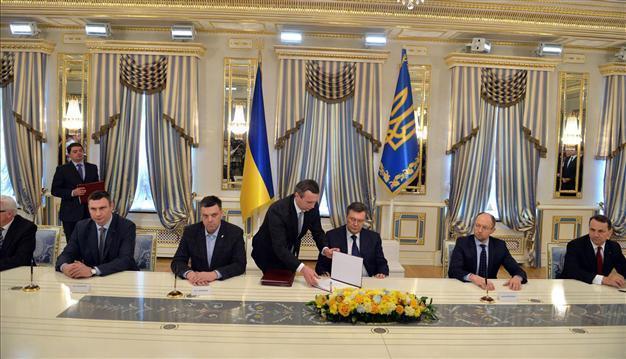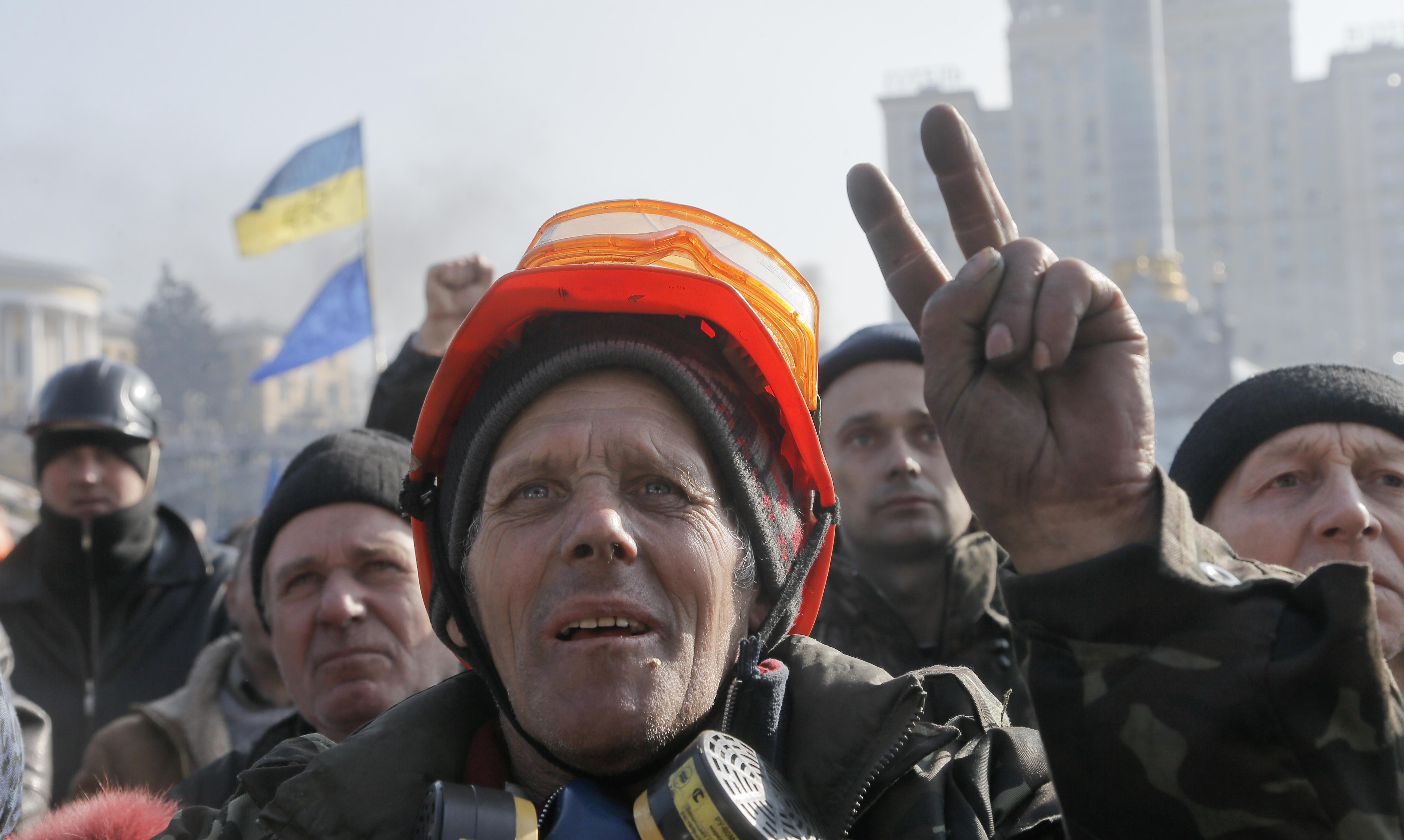Ukraine leader, opposition reach deal to end crisis
KIEV - Agence France-Presse

(From L) German Foreign Minister Frank-Walter Steinmeier, the head of the Udar (Punch) party Vitalii Klitschko, the head of the Svoboda party Oleh Tyagnybok, Ukrainian President Viktor Yanukovych, the head of Batkivcshchyna party Arseniy Yatsenyuk and Polish Foreign Minister Radoslaw Sikorski sign an agreement on Feb 21.
Ukraine's leader and opposition said Feb. 21 they had agreed a deal to end the splintered country's worst crisis since independence after three days of carnage left nearly 100 protesters dead and the heart of Kiev resembling a war zone.
President Viktor Yanukovych's dramatic announcement that he was ready to hold early elections and form a new unity government was brief and met with caution by the tens of thousands gathered on central Kiev's main square for a protest that began exactly three months earlier.
However, Ukraine's nationalist opposition leader Oleh Tyahnybok said the protesters had conditionally agreed to the terms.
"It was decided to approve the decision to sign the agreement with the president on the condition that the (current) interior minister is not in the next government and the attorney general is replaced," he was quoted as saying by Ukraine's Interfax news agency.
The European Union confirmed that a "temporary" agreement had been reached after marathon talks with Yanukovych and opposition leaders that began on Feb. 20.
The peace pact met the demands the opposition had laid down at the start of the protests. The balance of political power would shift back to parliament - as it had been before Yanukovych assumed the presidency in 2010 and took the nation of 46 million on a course away from the West and toward Russia.
It would also create an opposition cabinet with the authority to reverse Yanukovych's decision in November to ditch an historic deal that would have put Ukraine on the path to eventual membership of the EU, which many Ukrainians see as their protector from centuries of Russian domination.

In the deadliest day since the crisis erupted in November, at least 60 people were killed in fierce clashes in Kiev's Independence Square on Feb. 20, with police opening fire on protesters carrying makeshift shields while opposition medics said government snipers picked off demonstrators from rooftops.
Foreign ministers from Poland, Germany, and France along with their Russian counterpart flew in for emergency talks on Feb. 20 as the international community voiced increasing alarm about the crisis in the country.
The crisis flared in November when Yanukovych rejected an EU integration deal in favour of closer ties with historical master Russia, angering pro-EU parts of the population who rose up in protest.
The demonstrations had been largely peaceful, except for a brief outbreak of violence at the end of January, but the situation descended into deadly mayhem on Feb 18. Protesters had marched on parliament in a 20,000-strong peaceful rally aimed at pressuring the government into agreeing to their demands, but it descended into violence that lasted throughout the day and night.
But the opposition has radicalised since police used live ammunition to mow down dozens with snipers and Kalashnikov rifles.
The chant of "death to the criminal" - a reference to two later-pardoned convictions for petty crime Yanukovych received in the Soviet era - rose over Kiev's iconic Independence Square overnight Thursday.
Protesters want Yanukovych to stand trialOn Feb. 21, some 20,000 protesters congregated on Independence Square, which has been occupied by activists since November and still remains under opposition control despite a brief yet deadly raid by riot police earlier in the week.
While the atmosphere on the square was calm - and life elsewhere in Kiev creeped back to normal with the reopening of the city's metro system - protesters told AFP the deal was too little, too late.
"These steps were what we needed but I think it is now too late after all the blood that has been spilled," said Sergei Yanchukov, 58.
"It was a crime against humanity and Yanukovych should be sent to The Hague [home of the International Criminal Court]."
"At the very least he should resign immediately and be brought to justice."
The latest violence erupted Feb. 20- on what was meant to be a day of mourning for those killed earlier in the week - when protesters launched an offensive against riot police to kick them off the square.
Armed with Molotov cocktails, batons and paving stones, they pushed back the feared Berkut riot police, who responded with rubber bullets, stun grenades and Kalashnikov rifles.
Footage of the bloodbath that followed shocked the international community.
Deputy army chief resigns over violence
Government's attempts to involve the army to put down the unrest has prompted Ukraine's deputy army chief to announce his resignation on Feb. 21.
"Today the army is being involved in the civil conflict, which could lead to the mass deaths of civilians and soldiers," General Yuri Dumanski, deputy head of the army's general staff, told Channel 5 television in comments broadcast Feb. 21. "I have decided to hand in my resignation to avoid an escalation."
Dumanski's resignation is the second shock departure to rock the army of the crisis-hit country, after Yanukovych sacked the head of the general staff Volodymyr Zamana on Feb. 19 without explaining the move.
Zamana was known to have publically disagreed with Yanukovych at the start of the month when the embattled Ukrainian leader first considered imposing a state of emergency in response to the wave of anti-government protests gripping Kiev and other parts of the country.
The White House said it was "outraged by the images of Ukrainian security forces firing automatic weapons on their own people".
Volunteer medics, who made a makeshift morgue at a popular hotel overlooking the square, accused police of killing demonstrators with live rounds.
Ukraine's interior ministry responded that it reserved the right to use live munitions "in self-defence".
The ministry also accused "extremists" of seizing 67 of its troops at gunpoint and holding them hostage.
The shocking scale of bloodshed in the nation of 46 million sandwiched between Russia and the European Union prompted EU officials to slap travel bans against those responsible for ordering the use of force.
Italian Foreign Minister Emma Bonino said an agreement was also reached at an emergency EU meeting in Brussels to impose asset freezes on those with "blood on their hands".
U.S. Vice President Joe Biden also warned Yanukovych that Washington was ready to impose sanctions on officials guilty of ordering troops to fire on protesters.

 In the deadliest day since the crisis erupted in November, at least 60 people were killed in fierce clashes in Kiev's Independence Square on Feb. 20, with police opening fire on protesters carrying makeshift shields while opposition medics said government snipers picked off demonstrators from rooftops.
In the deadliest day since the crisis erupted in November, at least 60 people were killed in fierce clashes in Kiev's Independence Square on Feb. 20, with police opening fire on protesters carrying makeshift shields while opposition medics said government snipers picked off demonstrators from rooftops.